Episodes

Friday Nov 29, 2024
Exploring the intersection of VR, AI and Diplomacy
Friday Nov 29, 2024
Friday Nov 29, 2024
In this thought-provoking episode we delve into the fascinating intersection of virtual reality (VR) and artificial intelligence (AI) in the realm of diplomacy, highlighting their potential to transform multilateralism, peacebuilding, and peacekeeping.
Join us as we talk with Martin Wählisch, a UN professional with a wealth of knowledge and experience in innovative technological applications in diplomacy. Martin shares compelling insights from work in the UN and his current academic endeavors at the University of Birmingham, focusing on the integration of AI in governmental processes.
In this episode, we explore the roles VR and AI can play in conflict prevention, management, and resolution, offering concrete examples such as predictive analytics using machine learning for early warning systems, AI-powered public dialogues for peace negotiations, and VR experiences that foster empathy and understanding through immersive storytelling.
Dive into the challenges and opportunities that lie ahead as these technologies advance and reshape traditional diplomatic practices, all the while contemplating the ethical implications and necessary governance mechanisms. Don't miss this engaging conversation on how technology is revolutionizing diplomacy in a rapidly changing world.
Resources: Ask a Librarian!
United Nations Innovation Network
Futuring Peace
My Medium articles
The United Nations Virtual Reality Experiment on Vimeo
UN Web TV Documentary
Where to listen to this episode
Apple podcasts: https://podcasts.apple.com/us/podcast/the-next-page/id1469021154
Spotify: https://open.spotify.com/show/10fp8ROoVdve0el88KyFLy
YouTube: https://youtu.be/
Content
Guest: Martin Wählisch
Host: Francesco Pisano
Production and editing: Amy Smith
Recorded & produced at the United Nations Library & Archives Geneva

Friday Nov 22, 2024
How to use AI in peace making and negotiations
Friday Nov 22, 2024
Friday Nov 22, 2024
Welcome to another episode of The Next Page. Today, we delve into the transformative role of artificial intelligence in diplomatic matters, focusing on its application in peacemaking and negotiations.
Claude Bruderlien, a researcher and lecturer at Harvard, shares his wealth of experience as a professional negotiator working with the UN and other international organizations. Claude discusses the evolution of negotiation training and the integration of AI into diplomacy to enhance strategic planning and international collaborations.
The conversation covers real-world applications of AI in various negotiation contexts, including campus and climate negotiations, providing unique insights into how technological advancements are shaping future diplomatic efforts. Discover how AI aids negotiators by filtering complex data, simulating scenarios, and improving cross-cultural communication, all while retaining the essential human elements of empathy and connection.
Resources: Ask a Librarian!
Frontline Associates: AI Negotiation Challenge platform, which is designed to help train negotiators in the use of AI in their negotiations.
Where to listen to this episode
Apple podcasts: https://podcasts.apple.com/us/podcast/the-next-page/id1469021154
Spotify: https://open.spotify.com/show/10fp8ROoVdve0el88KyFLy
YouTube: https://youtu.be/LpD761ajkV4
Content
Guest: Claude Bruderlein, Researcher and Lecturer at the Harvard Kennedy School of Government, the Harvard T. Chan School of Public Health, and The Graduate Institute, Geneva
Host, production and editing: Amy Smith
Recorded & produced at the United Nations Library & Archives Geneva
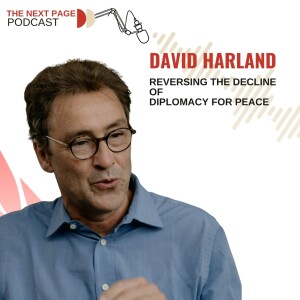
Friday Nov 08, 2024
Friday Nov 08, 2024
In this captivating episode we explore the evolving landscape of diplomacy and its pivotal role in fostering peace. Our guest, David Harland, the Executive Director of the Geneva Centre for Humanitarian Dialogue and a member of the UN Secretary General's High Level Advisory Board on Mediation, shares his vast experience and insights.
We cover the historical trajectory of diplomacy for peace, from its post-World War II successes to its recent decline, particularly over the past two decades. David discusses how diplomacy once effectively addressed existential threats, such as nuclear warfare, through strategic negotiations and treaties.
As we face new global challenges like climate change, pandemics, and artificial intelligence, David offers a critical analysis of how diplomacy has transformed and how it might adapt. He introduces concepts like "shifting constellations" and "hybrid diplomacy," highlighting the role of alternative actors, including NGOs and private companies, in today's diplomatic landscape.
Join us for a thought-provoking conversation on the future of diplomacy, the importance of setting priorities, and the potential for new diplomatic frameworks to address the pressing issues of our time. As we navigate this complex terrain, the question remains: will we assemble the tools necessary for a sustainable future?
Resources
Article: https://www.genevapolicyoutlook.ch/reversing-the-decline-of-diplomacy/
Geneva Centre for Humanitarian Dialogue: https://hdcentre.org/
Where to listen to this episode
Apple podcasts: https://podcasts.apple.com/us/podcast/the-next-page/id1469021154
Spotify: https://open.spotify.com/show/10fp8ROoVdve0el88KyFLy
YouTube: https://youtu.be/ay0RRjNR6Fs
Content
Guest: David Harland, Executive Director, Geneva Centre for Humanitarian Dialogue
Host: Francesco Pisano, Director, UN Library & Archives Geneva
Producer and editor: Amy Smith
Recorded & produced at the United Nations Library & Archives Geneva

Friday Oct 25, 2024
The Forever Crisis with Adam Day
Friday Oct 25, 2024
Friday Oct 25, 2024
Welcome to a compelling episode with Adam Day, Head of the UN University Centre for Policy Research in Geneva on his new book, "The Forever Crisis." In this engaging discussion, Adam introduces the concept of complex systems thinking, exploring its applicability to global governance and the pressing issues of our time.
Adam shares his journey from his role as a senior political advisor in Congo to his current position at the UN University's Center for Policy Research. He explains how his experiences led him to delve into the intricacies of complex systems and their unpredictable, yet not entirely unpredictable, nature.
The episode dives into key themes from Adam's book, including environmental governance, large-scale conflict resolution, cybersecurity, and the rise of artificial intelligence. He offers a critique of today's proposals for improving governance on global issues. Adam emphasizes the importance of moving away from linear thinking and top-down approaches, advocating instead for adaptive, networked solutions.
In a thought-provoking conclusion, Adam introduces the idea of a planetary immune system—a visionary concept aimed at addressing global challenges holistically. This episode is essential listening for anyone interested in understanding and navigating the complexities of our world today.
Resources
Day, A. (2024). The Forever Crisis: Adaptive Global Governance for an Era of Accelerating Complexity (1st ed.). Routledge. https://doi.org/10.4324/9781003506386
Soon available at UNOG Library
Day, A. (2022). States of Disorder, Ecosystems of Governance: Complexity Theory Applied to UN Statebuilding in the DRC and South. https://unog.primo.exlibrisgroup.com/permalink/41UNOG_INST/s5qper/alma991002408952102391
Keinfield, R. (2015) Improving Development Aid Design and Evaluation; Plan for Sailboats not Trains. https://carnegieendowment.org/research/2015/03/improving-development-aid-design-and-evaluation-plan-for-sailboats-not-trains?lang=en
Gladwell, M. (2002). The tipping point. Back Bay Books.
Where to listen to this episode
Apple podcasts: https://podcasts.apple.com/us/podcast/the-next-page/id1469021154
Spotify: https://open.spotify.com/show/10fp8ROoVdve0el88KyFLy
YouTube: https://www.youtube.com/watch?v=NcA39WB1KMo
Content
Guest: Adam Day, Head, UNU Centre for Policy Research, Geneva
Host: Francesco Pisano, Director, UN Library & Archives
Producer and editor: Amy Smith
Recorded and produced at the United Nations Library & Archives Geneva

Friday Oct 11, 2024
AI, Democracy, and International Relations with Jérôme Duberry
Friday Oct 11, 2024
Friday Oct 11, 2024
Welcome to a thought-provoking episode of The Next Page. Francesco Pisano, Director of the Library & Archives discusses the intersection of artificial intelligence, democracy, and international relations with Professor Jérôme Duberry from the Geneva Graduate Institute. With AI rapidly evolving and influencing political practices, diplomacy, and global governance, understanding its societal implications is more important than ever.
In this episode, Professor Duberry shares his insights on the dual nature of AI in democracy, highlighting both the hopes and concerns it raises. From micro-targeting in political campaigns to AI's role in shaping global policies, we explore how AI is reshaping the way we access information and engage in democratic processes.
As AI becomes a vital tool in diplomatic practice, we discuss its potential to augment human decision-making and the ethical considerations surrounding its use. Professor Duberry also sheds light on the challenges of governing AI on an international scale, examining the debates around AI ethics and regulation.
Finally, we address the importance of AI literacy, particularly for the younger generation, to ensure informed participation in shaping the future of technology. Tune in to gain a comprehensive understanding of AI's impact on our world and the critical need for inclusive governance.
Books by Jérôme Duberry:
Duberry, J. (2022). Artificial Intelligence and Democracy: Risks and Promises of AI-Mediated Citizen-Government Relations. Cheltenham, UK: Edward Elgar Publishing.
Duberry, J. (2019). Global Environmental Governance in the Information Age: Civil Society Organizations and Digital Media. Abingdon, UK : Routledge.
Where to listen to this episode
Apple podcasts: https://podcasts.apple.com/us/podcast/the-next-page/id1469021154
Spotify: https://open.spotify.com/show/10fp8ROoVdve0el88KyFLy
YouTube: https://youtu.be/Voay4XN23UA
Content
Guest: Dr. Jérôme Duberry, Managing Director of the Tech Hub, Co-Director Ad-Interim, Executive Education, and Senior Researcher at the Albert Hirschman Center on Democracy
Host: Francesco Pisano, Director, UN Library & Archives
Production and editing: Amy Smith
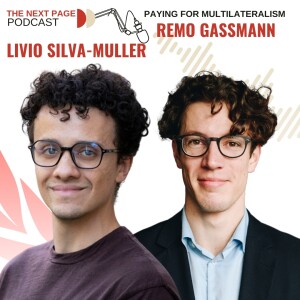
Friday Sep 27, 2024
Paying for Multilateralism: the financing of IOs in Geneva
Friday Sep 27, 2024
Friday Sep 27, 2024
Livio Silva-Müller and Remo Gassman speak with us about their findings on the financing of international organizations in Geneva, published in a report by the Geneva Graduate Institute. Their illuminating report covers 16 organizations and spans two decades, from 2000 to 2020, providing a comprehensive analysis of financial contributions to Geneva-based international organizations.
Livio and Remo put into perspective the total of 23.6 billion USD contributed in 2020 to the 16 organizations in the study and leave us with five take-away points from their research.
Join us as we explore the evolving landscape of multilateral funding, the role of major donors, and hear about some surprising findings that emerged from their meticulous research. Understand the trends, challenges, and implications of funding for international organizations dedicated to global health, humanitarian efforts, and beyond.
Discover how this research sheds light on the stability and future of international Geneva. Gain insights into the complexities of studying the financing of international organizations and future research needed to explore potential avenues for enhancing funding strategies moving forward.
Resources
Read the report and check out the figures mentioned in the conversation: https://www.graduateinstitute.ch/sites/internet/files/2024-06/geneva-policy-outlook-report.pdf
Where to listen to this episode
Apple podcasts: https://podcasts.apple.com/us/podcast/the-next-page/id1469021154
Spotify: https://open.spotify.com/show/10fp8ROoVdve0el88KyFLy
YouTube: https://youtu.be/ay0RRjNR6Fs
Content
Guests:
Livio Silva-Müller, PhD researcher, Albert Hirschman Centre on Democracy, Geneva Graduate Institute.
Remo Gassmann, Program Director, Global Development Policy, Heinrich Böll Foundation
Host, producer and editor: Amy Smith
Recorded & produced at the United Nations Library & Archives Geneva
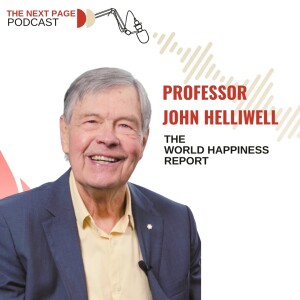
Friday Sep 13, 2024
Insights from the World Happiness Report with John Helliwell
Friday Sep 13, 2024
Friday Sep 13, 2024
Join us as we delve into the World Happiness Report with the distinguished Professor Emeritus John Helliwell. As a founding editor of the report, Professor Helliwell shares the origins of the report, the methodology behind measuring happiness, and the profound implications of the findings.
Discover the pivotal role of the 2011 UN Resolution supported by Bhutan, the importance of subjective well-being data, and how the report has evolved to influence global perspectives on happiness and well-being. Learn about the top-ranking countries and the factors that contribute to their success, as well as surprising findings from this year's report.
Professor Helliwell also explores the significance of social connections, trust, and benevolence, shedding light on how these elements impact our daily lives and national policies. This episode is a deep dive into the science of happiness and a call to integrate well-being into every aspect of decision-making.
Tune in to understand how we can all contribute to a happier, more compassionate world.
Resources
The World Happiness Report 2024: https://worldhappiness.report/ed/2024/
The Gallup poll:
https://news.gallup.com/poll/612125/happiest-country-earth.aspx
Sustainable Development Solutions Network:
https://www.gallup.com/analytics/247355/gallup-world-happiness-report.aspx
What's the happiest country in the world?
https://news.gallup.com/poll/612125/happiest-country-earth.aspx
The Wellbeing Research Centre, University of Oxford: https://wellbeing.hmc.ox.ac.uk/
Professor Helliwell’s book recommendation:
Gawande, A. (2014). Being mortal: Medicine and what matters in the end. Metropolitan Books/Henry Holt and Company.
https://atulgawande.com/book/being-mortal/
Where to listen to this episode
Apple podcasts: https://podcasts.apple.com/us/podcast/the-next-page/id1469021154
Spotify: https://open.spotify.com/show/10fp8ROoVdve0el88KyFLy
YouTube:
Content
Guest: John Helliwell
Host, producer and editor: Amy Smith
Recorded & produced at the United Nations Library & Archives Geneva
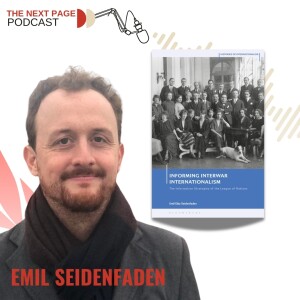
Friday Aug 30, 2024
Friday Aug 30, 2024
In this episode, Emil Seidenfaden, an historian presently undertaking postdoctoral research at the Saxo Institute, University of Copenhagen, joined us to talk about his recent book, Informing Interwar Internationalism.
This fascinating work combines international history and media history and explores the intersection of journalism and diplomacy at the time of the League of Nations.
Emil talks about the relationship between public information and legitimacy, and how the Information Section officials at the League negotiated the tensions between propaganda, public opinion and internationalism.
Resources
Seidenfaden, E. E. (2024). Informing Interwar Internationalism: The Information Strategies of the League of Nations. Bloomsbury Academic. Histories of Internationalism
Seidenfaden, E. E. (2020). Daniel Hucker, Public Opinion and Twentieth-Century Diplomacy. A Global Perspective. Leiden: Brill.
Potter, S. J. (2023). Broadcasting in the Cause of Peace: Regulating International Radio Propaganda in Europe, 1921–1939. The International History Review, 45(6), 843–864. https://doi.org/10.1080/07075332.2023.2224352
Sweetser, A. (1916) Roadside Glimpses of the Great War. Macmillan. London.
Covenant of the League of Nations: https://libraryresources.unog.ch/ld.php?content_id=32971179
The League of Nations Information Section: https://libraryresources.unog.ch/LONSecretariat/information
Emil’s book recommendation:
Cohen, D. (2023). Last Call at the Hotel Imperial. The Reporters Who Took On A World At War. Penguin Random House.
Where to listen to this episode
Apple podcasts: https://podcasts.apple.com/us/podcast/the-next-page/id1469021154
Spotify: https://open.spotify.com/show/10fp8ROoVdve0el88KyFLy
YouTube:
Content
Guest: Emil Seidenfaden
Host, producer and editor: Amy Smith
Recorded & produced at the United Nations Library & Archives Geneva
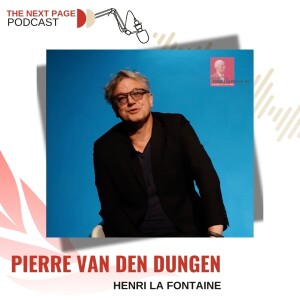
Friday Aug 16, 2024
Henri La Fontaine, un enragé de la paix avec Pierre Van den Dungen
Friday Aug 16, 2024
Friday Aug 16, 2024
Pour cet épisode, nous sommes enchantés d’accueillir Pierre Van Den Dungen pour parler d’Henri La Fontaine, un homme intense et fascinant gratifié du prix Nobel de la Paix en 1913.
Pierre Van Den Dungen, docteur en Philosophie et Lettres (Histoire), a consulté la totalité des papiers personnels de La Fontaine au Mundaneum, à Mons, afin de rédiger la biographie intitulée « Henri La Fontaine, prix Nobel de la Paix 1913 : une vie » publiée aux Editions Samsa en 2022. Pierre Van Den Dungen nous présente les grandes lignes de la personnalité de La Fontaine, en mettant en lumière son entourage, ses réseaux et sa sphère intime. Il explore ensuite les convictions pacifistes et mondialistes de La Fontaine, ainsi que son long mandat de 36 ans à la présidence du Bureau international de la Paix. Il traite également de la période de la vie de La Fontaine durant la Première Guerre mondiale, de son implication au sein de la Société des Nations, pour finalement évoquer les dernières années de sa vie durant la Seconde Guerre mondiale.
Ressources
Van den Dungen, Pierre. (2022) Henri La Fontaine, prix Nobel de la Paix 1913 : une vie. Bruxelles. Editions Samsa. https://www.henrilafontaine.be/ouvrage/henri-la-fontaine-2/
Rencontre avec Pierre Van Den Dungen : https://www.henrilafontaine.be/2023/01/07/chaire-hlf-rencontre-avec-pierre-van-den-dungen/
Fondation Henri La Fontaine : https://www.henrilafontaine.be/la-fondation/
Mundaneum : http://www.mundaneum.org/fr
Discours d’Henri La Fontaine, 8ème séance plénière de la première Assemblée de la Société des Nations, 20 novembre 1920 (p. 171 du PDF) : https://archives.ungeneva.org/the-records-of-the-first-assembly-plenary-meetings
Description des archives du Bureau International de la Paix (1891-1951) : https://archives.ungeneva.org/international-peace-bureau
Où écouter cet épisode
Apple podcasts: https://podcasts.apple.com/us/podcast/the-next-page/id1469021154
Spotify: https://open.spotify.com/show/10fp8ROoVdve0el88KyFLy
YouTube: Henri La Fontaine, un enragé de la paix avec Pierre Van den Dungen (youtube.com)
Contenu
Invité : Pierre Van den Dungen
Hôte : Hermine Diebolt
Réalisation : Amy Smith
Enregistré et réalisé à la Bibliothèque & Archives des Nations Unies à Genève

Friday Aug 02, 2024
Surviving the UN - a conversation with Robert Bruce Adolph
Friday Aug 02, 2024
Friday Aug 02, 2024
Robert Bruce Adolph joined us for this short episode to talk about his book Surviving the UN: The Unexpected Challenge. Robert worked on assignments in many conflict areas in the world in the 1990s during his second career as a UN Chief Security Officer, following his retirement as US Army Special Forces Lieutenant-Colonel. He was present during the deadly bomb attack on the UN compound in Baghdad on 19 August 2003.
Over two decades later, as we approach the anniversary of that horrific event, Robert Adolph talks about why he wrote the book and about learning from failure.
Resources
Adolph, Robert Bruce. (2020). Surviving the UN: The Unexpected Challenge. New Academia Publishing/Vellum.
(Available at the UNOG bookstore)
Website: Robert Bruce Adolph - https://robertbruceadolph.com/
Bob's book recommendation
Pinker, Steven. (2012). The Better Angels of Our Nature: Why Violence Has Declined. Penguin Books.
Where to listen to this episode
Apple podcasts: https://podcasts.apple.com/us/podcast/the-next-page/id1469021154
Spotify: https://open.spotify.com/show/10fp8ROoVdve0el88KyFLy
YouTube: https://www.youtube.com/
Content
Host: Amy Smith
Speakers: Robert Bruce Adolph
Production and editing: Amy Smith
Recorded & produced at the United Nations Library & Archives Geneva
*This episode was recorded online and we apologize for the low sound quality.

The #NextPagePod
Are you curious about the power of international cooperation? And how it affects our future? Then tune in to the #NextPagePod, the podcast designed to advance the conversation on multilateralism!
Each episode delves into global issues through a multilateral lens, exploring how collaboration across disciplines can facilitate reaching common goals.
Produced at the United Nations Library & Archives Geneva
Editorial Team:
Editor & Coordinator - Amy Smith
Hosts: Francesco Pisano, Natalie Alexander, Amy Smith, Blandine Blukacz-Louisfert, Hermine Diebolt.
Podcast logo and designs - Natalie Alexander, Amy Smith.





